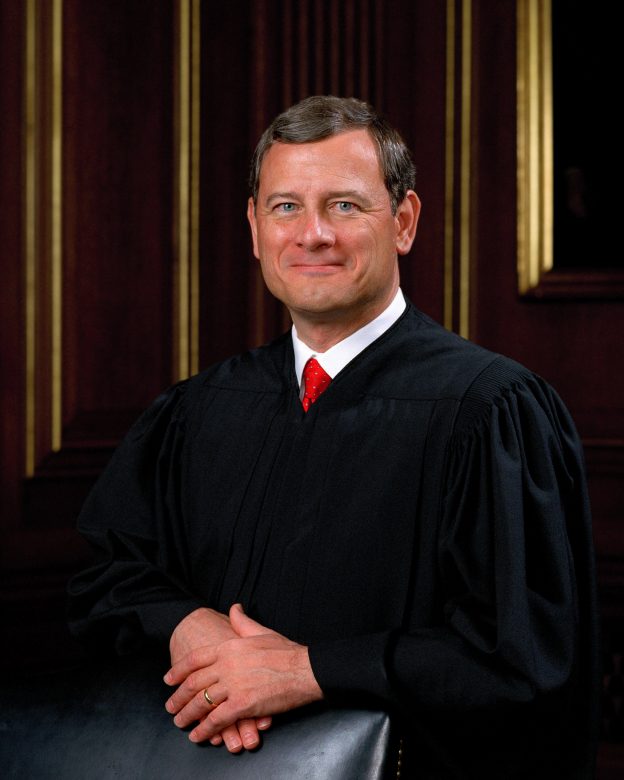Is John G. Roberts Jr. no more than a smooth operator, I wondered on September 15, 2005.
I began tracking the now infamous Justice Roberts a month earlier, around the time he was exciting admiration from gay-rights activists for winning “Romer v. Evans” for them. The Los Angeles Times, at the time, noted that “Romer v. Evans” had “struck down a voter-approved 1992 Colorado initiative that would have allowed employers and landlords to exclude gays from jobs and housing.”
Gay activists still consider the decision Roberts won for them the “single most important positive ruling in the history of the gay rights movement.” Special pleading not being this column’s “thing,” arguments from and against so-called gay rights did not sway me much. Rather, I urged readers to pay attention to Roberts’ efforts against the private property and freedom of association of all Coloradans. “When property is rendered insecure,” warned Edmund Burke, “so is liberty.”
Alas, Roberts’ (pro bono) work comported with 14th-Amendment jurisprudence, aspects of which violate private property rights and freedom of association. Simply put, to the extent that the Constitution coincides with the natural law, it is good. More often than not, it has buried natural justice under the rubble of legislation and statute.
My choice for the Supreme Court of the United States, back when President Bush was pushing the goofy Harriet Myers, was Justice Janice Rogers Brown. An originalist, Justice Brown is also black. Pigment, however, only works in favor of candidates of the Left.
“Today’s senior citizens blithely cannibalize their grandchildren because they have a right to get as much ‘free stuff’ as the political system will permit them to extract.” This was just one of Justice Brown’s many admirable utterances. (Today’s brazen cannibals would object to Brown’s “maligning” as vociferously as America’s obese derided this writer for telling the truth about their fat and flaccid icon, Citizen Karen Klein.)
In any event, for being a strict constructionist (and for her fondness for white men such as Thucydides, F.A. Hayek, and Burke), Brown was bypassed by Bush for associate justice of the United States Supreme Court. Samuel Alito was nominated instead.
Back then, the president’s lickspittles refused to concede that Bush himself regarded Rogers Brown as “outside the mainstream,” to use a Democratic line. I was unsurprised. “Why would George Bush care whether a judicial nominee can tell Blackstone from Bentham, when he can’t?”
Then again, my observations during Justice Roberts’ confirmation hearing were colored by a quaint bias against statist legalism. So, while it was hard not to warm to Roberts, who displayed the poise and humility his inquisitors (Charles Schumer and Joe Biden) lacked—there were troubling signs.
What Roberts had to say about the eminent domain case of Kelo v. the City of New London (2005) was just a little too diplomatic for my tastes, given the substance of that case. As if the Constitution’s naturally illicit public-use clause was not bad enough, The Court, in Kelo, as I understood it, affirmed the transfer of private property from one invariably reluctant owner to another eager and well-connected one.
All for the “Common Good.”
In no way could this decision be framed as deference to Connecticut’s sovereignty. This might have been the case had The Court declined to consider the case. Kelo, I wrote, had, to all intents and purposes, nationalized unjust takings.
Roberts was mildly reassuring, reminding Congress of its duty to step in and uphold “rights.” This was way too vague considering the stakes: state-mediated theft.
But, here’s the thing that unsettled so about Roberts’ performance during confirmation proceedings. Or so I wrote on September 15, 2005: “He seems to be all about the moves.”
The Mother of All Confirmation Questions was posed, out of the blue, by some Senator, whose name I can’t recall. This good fellow asked Roberts whether the Administrative State against which we Americans struggle was compatible with the Constitution and the Founding Founders’ vision. The Managerial State—its endless rules and regulations—whence does it derive its legitimacy?
It wasn’t that Roberts was flummoxed by this first-principles quandary out of the Senate; it just seemed alien to him; it swooshed right by. Roberts answered what was a philosophical question with a legalistic ramble about administrative law.
“I find it hard to believe that such a gifted man would misconstrue so simple a question,” I worried.
But then Roberts, regrettably, is no Janice Rogers Brown.
By now you know that John G. Roberts Jr., chief of the country’s legal politburo of proctologists, rewrote Obama’s Affordable Care Act, and then proceeded to provide the fifth vote to uphold the individual mandate undergirding the law, thereby undeniably and obscenely extending Congress’s taxing power.
Still, scurrilous statists—Bush and Roberts loyalists—find consolation in the fact that, the majority decision in the “National Federation of Independent Business v. Sebelius” “limits” Congress’ spending power, as well as the commerce and “necessary and proper” clauses.
©2012 By ILANA MERCER
WND & RT
July 6
CATEGORIES: Constitution, Founding Fathers, George W. Bush, Healthcare, Law, Natural Law, Private Property Rights

 print
print